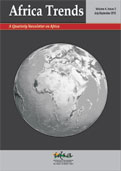Opening Remarks
H.E Alem Tsehaye Woldemariam, Ambassador of Eritrea and Dean of African Heads of Missions
It is my pleasure to be here for this important Africa Day roundtable dialogue on India-Africa Partnership in a Changing World.
- Alem Tsehaye Woldemariam
- July-December 2019
- Africa Trends








